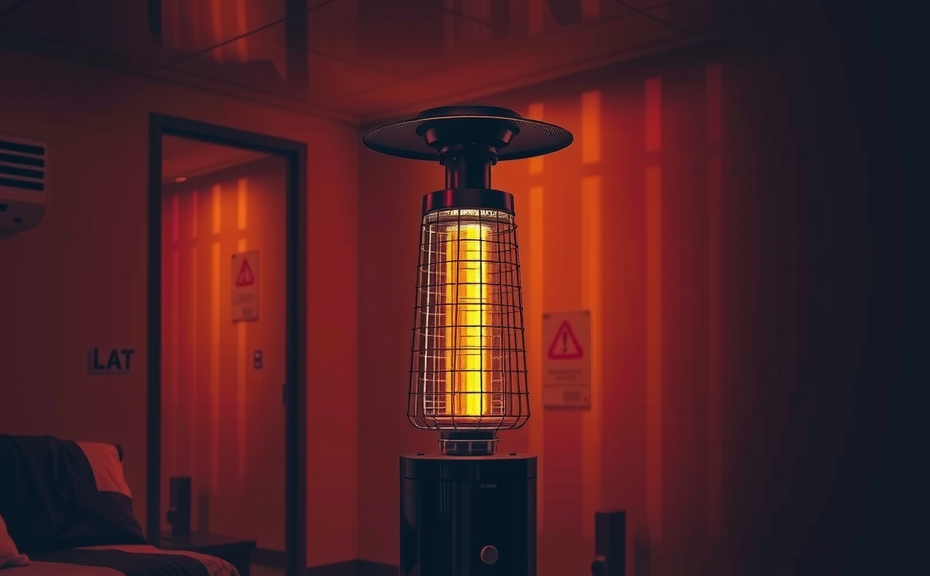Using additional heating devices can alter indoor environments in ways often underestimated. While they provide warmth during colder months, these appliances can negatively affect indoor air quality.
Dust and allergens have a tendency to gather around a space heater, which may exacerbate existing respiratory issues for individuals with sensitivities.
Regular maintenance of these devices is imperative; without it, they can become fire hazards, creating dangerous situations in the home.
A significant health risk associated with certain models involves the potential for carbon monoxide poisoning, particularly with those powered by gas. Awareness of these factors is important for safe operation and understanding potential health risks.
Are Space Heaters Safe For Health
Many users overlook potential health implications associated with portable heating devices. Respiratory issues can develop in individuals who are particularly sensitive to dust and allergens, as various models may stir up particles circulating in the air.
Some electric heaters pose a risk of burns or skin irritation due to high surface temperatures.
Implementing safety precautions, such as ensuring proper ventilation, plays a significant role in mitigating these risks.
Keeping heaters at a safe distance from flammable materials not only protects users but also reduces fire hazards in homes. Regular maintenance and cleaning of these appliances can significantly enhance indoor air quality, thereby decreasing the likelihood of allergy triggers and other respiratory health concerns.
The following section will delve deeper into the specific health risks associated with using space heaters.
Understanding Health Risks Of Space Heaters
Utilizing portable heating appliances can create a comfortable environment, yet they also pose notable health risks. The thermal radiation emitted during operation may compromise indoor air quality, leading to the release of pollutants that can trigger respiratory problems.
Research shows that individuals with pre-existing conditions like asthma may experience worsened symptoms with frequent exposure.
Allergies can also be exacerbated, particularly for sensitive populations such as children and the elderly.
Improper use not only elevates health concerns but significantly increases the likelihood of fire hazards, with numerous incidents reported annually. Vulnerable groups, including pets, are particularly endangered due to their smaller lung capacity and lesser awareness of potential dangers.
Adhering to the user manual for proper setup and maintenance can help diminish these risks effectively.
Importance Of Ventilation With Heaters
Maintaining proper airflow is necessary when operating heating systems to create a safe and pleasant indoor atmosphere. Without sufficient ventilation, harmful byproducts, such as carbon monoxide, can build up, particularly with fuel-burning devices.
These emissions can lead to significant health issues, including dizziness and, in severe cases, life-threatening conditions.
The size of the room also influences ventilation.
Insufficient airflow can increase humidity levels, which may encourage mold growth and exacerbate respiratory problems. Implementing effective maintenance tips, such as regular inspections of the ventilation systems, can improve energy efficiency and air quality.
This proactive approach can protect occupants from the dangers associated with poor ventilation and ensure that the environment remains safe and comfortable.
How To Prevent Fire Hazards
Reducing the risk of ignition from heating devices involves implementing effective strategies. Safety features such as automatic shut-off timers play an important role; they can significantly mitigate potential hazards when devices are left unattended.
Proper placement of infrared heaters is equally important; maintaining a three-foot clearance around these appliances helps to prevent accidental contact with flammable materials.
Many individuals may overlook common household items, like curtains or paper, which can ignite rapidly.
Regular maintenance is necessary to detect any unusual sounds or emissions that might indicate malfunction. Addressing these issues promptly can prevent dangerous situations from arising.
Engaging all household members in discussions about fire safety creates an environment of shared responsibility and awareness. This proactive approach can help everyone understand the health effects associated with overheating and toxic fumes, further diminishing the potential for accidents
Effects Of Overheating On Health
Excessive indoor temperatures can lead to a range of health complications often overlooked by many individuals. Elevated warmth may result in dehydration, as the body loses fluids through perspiration.
This fluid loss can thicken the blood, increasing the potential for cardiovascular events.
Chronic exposure to heated air can also exacerbate existing respiratory conditions, acting as asthma triggers by reducing humidity levels.
Extreme warmth poses a risk of skin burns, particularly for individuals with sensitive skin. Utilizing humidifiers can assist in managing these effects, creating a more stable indoor environment and mitigating risks associated with prolonged heat exposure.
Transitioning from concerns regarding overheating, it becomes essential to consider the quality of indoor air, which can be significantly affected by heating systems and humidity levels.
Assessing Indoor Air Quality Issues
Assessing the quality of air within a living environment plays a significant role in promoting health and comfort. Common indoor pollutants can include dust, mold, and volatile organic compounds, which may be introduced or aggravated by the use of heating devices like portable heaters.
For example, convection heaters can amplify the circulation of allergens, making it easier for them to remain airborne.
Research indicates that approximately 50% of residences exhibit elevated levels of indoor air contaminants.
Regular evaluation of these conditions is imperative to ensure a safe and healthy atmosphere, particularly when utilizing electrical safety devices during colder months. Frequent monitoring helps mitigate health risks associated with pollutants and enhances the effectiveness of heating systems.
Indoor Air Quality
- Indoor pollutants such as dust, mold, and volatile organic compounds can significantly affect health.
- Convection heaters can increase the circulation of allergens, keeping them airborne.
- Approximately 50% of residences have elevated levels of indoor air contaminants.
- Regular monitoring of indoor air quality is essential for a safe and healthy living environment.
Safety Precautions For Pet Owners
Maintaining a safe environment for pets is paramount, especially when heating elements are present. Heaters can introduce various dangers, such as burns or overheating, if not handled with care.
It is advisable to position space heaters at least three feet away from pets to minimize risks.
Ensure cords are secured to eliminate tripping hazards.
Regularly inspect smoke detectors and keep fire extinguishers accessible to bolster safety guidelines. Conducting a risk assessment of your home may help pinpoint potential threats related to heating.
Observing your pets’ behavior is also important; unusual signs of distress may suggest discomfort from excessive heat.
Choosing The Right Fuel Type For Heaters
Choosing a fuel option for heaters influences various factors related to their operation and overall efficiency. The heating capacity of different fuels can impact the speed and effectiveness with which a space reaches a comfortable level.
Each type has unique combustion properties, directly affecting both efficiency and emissions levels.
For example, natural gas combustion produces fewer air pollutants compared to oil, which is beneficial for indoor air quality.
Many modern heating units incorporate advanced safety features aimed at minimizing risks during usage duration. User reviews frequently emphasize the importance of regular maintenance, which can significantly enhance the service life of these systems.
A well-informed decision regarding fuel selection can lead to improvements in home comfort, health, and energy efficiency.

